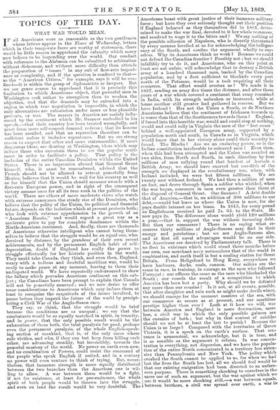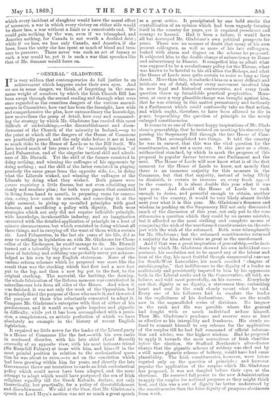TOPICS OF THE DAY.
WHAT WAR WOULD MEAN.
IF all Americans were as reasonable as the two gentlemen whose letters appear in the Times of Wednesday, letters which in their temperate force are worthy of statesmen, there would be little reason to apprehend the calamity which many now believe to be impending over the world. Our conduct with reference to the Alabama can be submitted to arbitration without dishonour, and without more difficulty than attends the preparation of " issues " in any suit of first-rate importance or complexity, and if the question is confined to that—. as the "American Citizen," for example, says it will be confined—it is within the grasp of diplomatists or lawyers. But we see grave reason to apprehend that it is precisely this limitation to which Americans object, that powerful men in Washington seek rather to strengthen than to weaken the objection, and that the demands may be extended into a region in which true negotiation is impossible, in which the only alternatives are submission under more or less plausible pretexts, or war. The masses in America are mainly influenced by the sentiment which Mr. Sumner embodied in his speech,—that their country has been treated wrongfully, and must from mere self-respect demand redress ; that its honour has been assailed, and that no reparation therefore can be sufficient unless it includes repentance. But we see strong reason to suspect that other and more statesmanlike, if more dangerous ideas, are floating at Washington, ideas which may induce those who entertain them to use the popular sentiment in order to facilitate a policy. That policy is the inclusion of the entire Canadian Dominion within the United States. There is an impression abroad that General Grant himself, who, it must be remembered, advised that the French should not be allowed to retreat peacefully from Mexico, believes that it would be well for his country as well as for himself that the Union should measure swords with a first-rate European power, and in right of the consequent victory assume once for all its true rank in the politics of the world. There are others of more moderate views who watch with extreme annoyance the steady rise of the Dominion, who believe that the polity of the Union, its political and financial future, depends on the isolation which at present protects both; who look with extreme apprehension to the growth of an "American Russia," and would regard a great war as a moderate price to pay for complete dominance within the North-American continent. And, finally, there are thousands of Americans otherwise intelligent who cannot bring themselves to believe that the struggle would be an equal one, who, deceived by distance, by the grandeur of their own recent achievements, and by the permanent English habit of selfdepreciation, doubt if England has really the power to struggle effectually for her historic position in the world. They could take Canada, they think, and even then, England, weary with a tedious and doubtful maritime war, would be ready to make peace at any moment, leaving to them their undisputed world. We have repeatedly endeavoured to show the fallacy which pervades American sentiment on this subject; the Canadians have been prompt to explain that Canada will not be peacefully annexed ; and we now desire to offer some considerations to Americans which may induce them at least to recognize the magnitude of the issues involved, to pause before they imperil the future of the world by precipitating a Civil War of the Anglo-Saxon race.
They say, or think, that the struggle would be brief because the conditions are so unequal ; we say that the combatants would be so equally matched in spirit, in tenacity, and in power, that the only possible result would be the exhaustion of them both, the total paralysis for good, perhaps even the permanent paralysis, of the whole English-speaking section of mankind, that is, of the only races whose rule vivifies, and who, if they can but keep from killing each other, are advancing steadily, but irresistibly, towards the peaceful mastery of the world. No power on earth even now, and no combination of Powers, could resist the command of the people who speak English if united, and in a century no power will even venture to think of trying. But, nevertheless, that immense strength is more equally distributed between the two branches than the American one is willing to allow. A war between them would be a fight, if not for existence, at least for pre-eminence, the whole spirit of both people would be thrown into the struggle, and even on land the result would be very doubtful. The Americans boast with great justice of their immense military force; but have they ever seriously thought out their position if England behaved as they themselves did in 1861, determined to make the war final, devoted to it her whole resources, and resolved to wage it to the bitter end ? We say nothing of the possible adhesion of Napoleon, who is directly threatened by every menace levelled at us for acknowledging the belligerency of the South, and confine the argument wholly to ourselves. Why do Americans think us weak ? Because we could not defend the Canadian frontier ? Possibly not ; but we should infallibly try to do it, and Americans, who on this point at least are not unfair, will acknowledge that to destroy a British army of a hundred thousand men, backed by the Canadian population, and by a fleet sufficient to blockade every port north of the Potomac, would be a task requiring all their resources. That effort would overtax us ? We made it in 1857, sending an army five times the distance, and after three years of a war which covered a continent that army remained in India, with its strength unbroken or increased, while at home another still greater had gathered in reserve. But we have Ireland ? Has not the Union a South, or do Northern Americans believe that the sentiment of Irishmen towards us is worse than that of the Southerners towards them ? England, if forced into this horrible war, would and could stop at nothing, would and could rally in Virginia the men of the "lost cause behind a well-appointed European army, supported by a population north and south, in Canada as in Virginia, which would know that in her victory alone could their security be found. The Blacks ? Are we an enslaving power, or is the Indian constitution intolerable to coloured men ? Even then, when this had been attempted and the Union was assailed on two sides, from North and South, in each direction by four millions of men rallying round that hardest of kernels a British Army, we should have exerted but one-fifth of the strength we displayed in the revolutionary war, when, with Ireland included, we were but fifteen millions. We are twenty now without Ireland. We had then a million of men on foot, and drove through Spain a soldier who wielded, when the war began, resources in men even greater than those at the disposal of General Grant. Our finances ? A debt double that of America,—that is, an addition of 300 millions to our debt,—would but leave us where the Union is now, for she pays double interest on her loans. In 1815, for every pound an Englishman received he paid 7s. 6d. to the State. He now pays 2s. The difference alone would yield 120 millionsa year,—that is, support the war without incurring debt. But then our commerce ? There is no saying what resources thirty millions of Anglo-Saxons may find in their energy and patriotism ; but we are Anglo-Saxons also, and at first all naval advantages would be on our side. The Americans are deceived by Parliamentary talk. There is no fleet in existence which could stand three months before our own, our merchant navy outnumbers that of the world in combination, and earth itself is but a coaling station for Great Britain. From Heligoland to Hong Kong, everywhere we have harbours, docks, coals, cannon. Our sailors are the same in race, in training, in courage as the men who followed Farragut ; our officers the same as the men who blockaded the South ; our vessels the result of a competition to which America has been but a party. Why should we be defeated any more than our cousins ? Is it not, at all events, possible, that after slaughter and ruin such as might make devils wince, we should emerge for the moment masters of the sea, with our commerce as secure as at present, and our maritime prestige higher than ever ? Look at it how we will, war between America and England is mere destruction, mere loss, a civil war in which the only possible gainers are the enemies of both ; but why in that contest of suicides
should we not be at least the last to perish Because the Union is so large ? Compared with the territories of Queen Victoria, it is a speck on the earth's surface. That sentence is nonsensical, we acknowledge, but it is true, and is as sensible as the argument it refutes. In war concentration is everything, not dispersion, and we have the population of the entire North concentrated in a territory less extensive than Pennsylvania and New York. The policy which crushed the South cannot be applied to us, for when we had lost the lives the South has lost, all we should feel would be that our existing emigration had been diverted to an unforeseen purpose. There is something shocking to ourselves in the mere use of such an argument, but the war against which we use it would be more shocking still,—a war between equal!, between brothers, a civil war spread over earth, a war in
which every incident of slaughter would have the moral effect of massacre, a war in which every victory on either side would be sheer loss, a war without a limit or a conceivable end. We could gain nothing by the war, even if we triumphed, and America nothing, for Canada is not worth a doubled debt ; while if we lose, we lose only Canada, and America, if she loses, loses the unity she has spent so much of blood and treasure to preserve. There never was such an act of lunacy as such a war would be, yet it is such a war that speeches like that of Mr. Sumner would force on.































 Previous page
Previous page